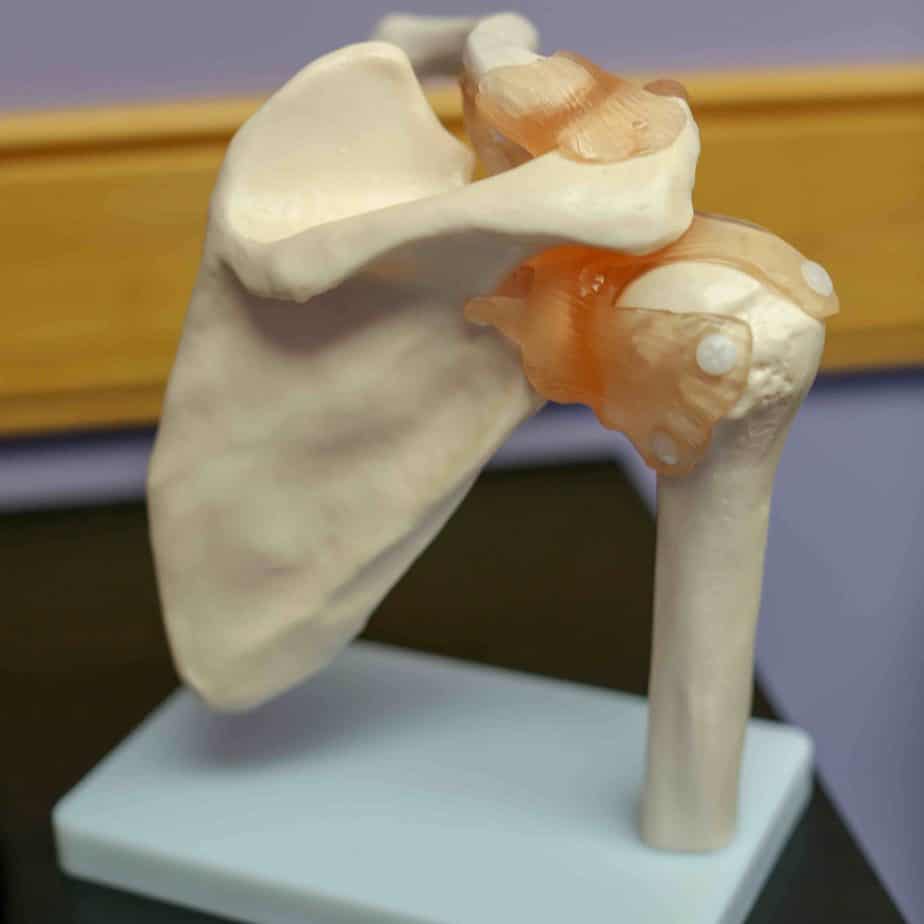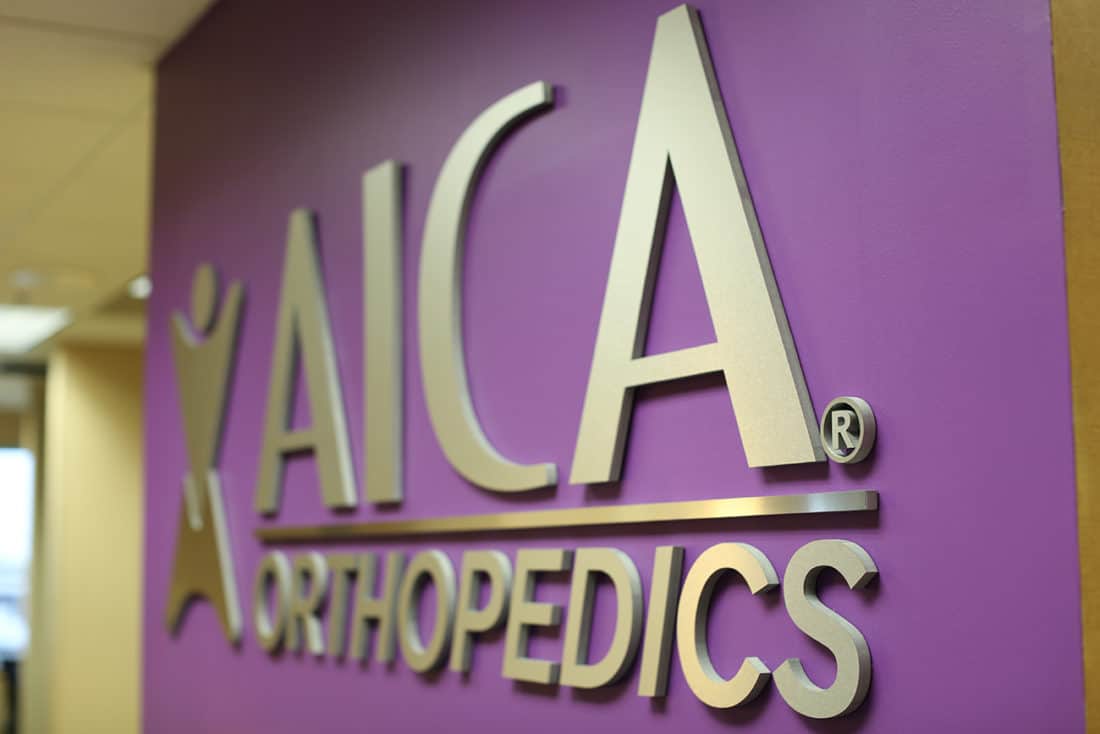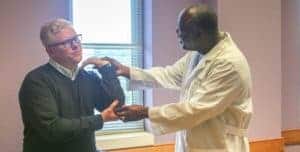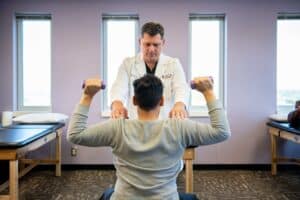Torn Rotator Cuff
The rotator cuff is a collection of tendons and muscles that connect to the shoulder bone. The rotator cuff muscles help with lifting movements of the shoulder, offer stability, and support day-to-day mechanical movement of the shoulder. When the rotator cuff becomes damaged, such as with a tear, the shoulder’s movements and capabilities can become severely limited and the associated pain can be excruciating.
Rotator cuff tears are prominent among people of all ages and over 200,000 people throughout the United States require medical treatment each year. Most tears cause significant pain and depending on the extent of the injury, it can prevent patients from performing basic activities or following through with their responsibilities.
Contact us today at AICA Orthopedics if you may have a torn rotator cuff or are experiencing pain, discomfort, or reduced mobility in the shoulder area.
If you are experiencing pain on the top of your shoulder and/or on your arm as low as the elbow, these symptoms may be indicating a torn rotator cuff. Common imaging methods for identifying a torn rotator cuff include MRIs, x-rays, and ultrasounds.
Treating most cases of a torn rotator cuff is done non-surgically through medication (anti-inflammatory), physical therapy, steroid injections and more depending on the severity of the tear. A combination of doctors, like our shoulder specialists at AICA, will help to properly diagnose a torn rotator cuff, the severity of the tear, and in providing the most accurate and effective treatment for your case.
Contact our friendly and experienced team at AICA Orthopedics to learn more about torn rotator cuffs and treatment solutions for your situation.
What Causes a Torn Rotator Cuff?
Tearing your rotator cuff can occur in a variety of ways, but there are two common categories of causes: a significant injury or natural wear-and-tear through aging. Below are the most common causes of a torn shoulder:
- Age – As your age increases, the risk of a torn rotator cuff also increases. Torn rotator cuffs are most commonly associated with individuals 40 years of age or older.
- Family Genetics – Some families may have a genetic component that increases the likelihood that individuals will experience a torn rotator cuff easier than individuals in other families.
- Sports – Some sports are high-impact or use repetitive arm motions that wear out the shoulder and its tendons, creating an increased likelihood of a torn rotator cuff injury. Additionally, certain impacts in sports can overextend the shoulder and result in a torn rotator cuff.
- Jobs with Repetitive Arm Motions – Certain work opportunities can increase the likelihood of a rotator cuff injury, including, but not limited to, house painting, carpentry, construction jobs, and other occupations that involve repetitive arm motions.

Torn Rotator Cuff Symptoms
Patients with a torn rotator may experience pain that fluctuates in intensity and does not completely subside for some time. The pain becomes unbearable when injured patients attempt to lift their arms above their head, usually to reach an object. Our Atlanta Orthopedic Doctors can diagnose where the source of a torn rotator injury is by following through with a complete examination that measures the severity of joint damage. If the examination proves the existence of a tear, an MRI scan will take place to confirm.
Due to the nature of the shoulder, most torn rotator cuff symptoms will be associated with the shoulder, but there can be other symptoms when dealing with a rotator cuff-related injury:
- Dull ache within the shoulder
- Weakness in the arm
- Difficulty to do any task that requires lifting the arm to a certain height or behind the head or back
- Everyday task becoming difficult due to tension or pain in the shoulder
- Decreased ability to sleep normally (especially if you sleep on your side)
Diagnosing a Torn Rotator Cuff
Often times recognizing the symptoms of a torn rotator cuff can be enough to indicate a torn rotator cuff. To accurately ensure that you have a torn rotator cuff (and not another type of injury or condition), a proper diagnosis is needed through specialized imaging techniques. These imaging techniques allow our team of doctors to get to the root of the problem and identify whether or not you have a torn rotator cuff. That information allows a doctor to provide personalized treatment solutions for you.
MRIs (magnetic resonance imaging) is often the go-to imaging solution for diagnosing most cases of torn rotator cuff injuries. In some cases, additional imaging methods may be required, such as an x-ray, radiograph, CT scan, sonograph, or arthrography.
These imaging techniques allow a doctor or specialist to get a detailed view of your shoulder and the biological components within it, including the bone, ligaments, tendons, and other tissues. With each test, additional layers of the shoulder’s tissues are explored and more information is provided, allowing for more accurate treatment suggestions.
Diagnostics
MRI
In the event that your doctor suspects you have torn your rotator cuff, MRI imaging will be ordered to confirm the injury with an image. The test is done with the use of magnetic fields to show image gradients and produce a clear picture of your injury.
LEARN MOREx-ray
An x-ray might also be necessary to see the extent of the harm done to your rotator cuff. It might indicate if there are any bones spurs that cause similar pain.
LEARN MORECT scan
CT scans can show your physician the source of your injury using cross-sectional images compiled together to show your complete anatomy. Soft tissue injuries like a torn rotator cuff can be easily diagnosed this way.
LEARN MORERadiography
Radiography can be a very useful tool for a specialist to diagnose the presence of torn rotator cuff disease, which will indicate the need for treatment of some kind.
Torn Rotator Cuff Treatment
If you’re experiencing torn rotator cuff symptoms or have pain and discomfort in your shoulder, contact AICA Orthopedics today. Our team of experienced doctors and healthcare specialists are committed to helping individuals make a recovery from all medical conditions and injuries.
We will do a complete diagnostic workup to ensure we are treating to root cause of your pain, and then we will make recommendations on what type of treatment to seek based on the severity of your rotator cuff injury.
Common forms of treatment for a torn rotator cuff include physical therapy, anti-inflammatory medications, injections of cortisone, and torn rotator cuff surgery. In most cases, shoulder surgery is not required to treat a torn rotator cuff and provide relief from the pain you’re experiencing.
AICA Orthopedics offers a variety of non-surgical treatment options for most common types of torn rotator cuff injuries. Chiropractic is often an ideal starting place for many, as chiropractic care helps to realign the parts of the body that has shifted over the years or from arm movements caused by day-to-day activities, sports, and injuries.
The results of the examination will determine which treatment options are appropriate. A few non-surgical solutions include rest and adjustments to particular behaviors or activities. Rest helps reduce inflammation and can alleviate pain. Physical therapy may be recommended to help restrengthen damaged muscles or a cortisone injection may be used to reduce swelling and pain. If non-surgical treatment is not appropriate or unsuccessful, your Orthopedic Doctor may recommend surgery.
In rarer cases, torn rotator cuff surgery may be required if the symptoms from your torn shoulder have not improved in 6 to 12 months and you are experiencing significant weakness in your shoulder (or loss of function). Some acute injuries that cause a tear may also make torn rotator cuff surgery a candidate. An orthopedic surgeon at AICA Orthopedics will discuss recommend surgical options based on your situation. The benefits, recovery time, and other risks will be provided for you to make the most informed decision.
During surgery, our surgical specialists repair the torn rotator cuff by re-attaching the tendon to the head of the upper arm bone (known as the humerus) where it originated. If the tear is not severe, such as a partial tear requiring surgery, debridement may be done to trim or smooth the tear.
The decision to follow through with surgery requires a series of conversations between the patient and doctor. It’s important to understand how the procedure works, what the doctor’s goals are, and how it will impact everyday activities. To help support the recovery process, physical therapy may be recommended after surgery to help restore mobility and muscle strength.
Reach out to our team at AICA Orthopedics to ask questions or learn more about a torn rotator cuff and the best treatment options for you.




